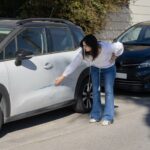Experiencing your car jerk as you’re coming to a stop can be unsettling and raise concerns about your vehicle’s health. This isn’t just an uncomfortable sensation; it’s often a sign that something within your braking system isn’t functioning correctly. Understanding why your car is jerking when stopping is the first step towards addressing the issue and ensuring your safety on the road. In most cases, this problem is related to components within your brakes, and this article will explore the most frequent culprits: worn brake pads, warped brake rotors, and faulty brake calipers.
Worn Brake Pads: A Frequent Cause of Jerky Stops
Brake pads are essential for slowing down and stopping your car. They work by pressing against the brake rotors, creating friction that converts kinetic energy into heat, thus reducing your vehicle’s speed. However, this friction causes brake pads to gradually wear down over time. Factors like frequent city driving with stop-and-go traffic, aggressive braking habits, and even the quality of the brake pads themselves can accelerate this wear.
When brake pads become excessively worn, they lose their optimal friction surface. This can lead to uneven contact with the rotors, causing a vibration or jerking sensation as you apply the brakes. Ignoring worn brake pads can not only worsen the jerking but also damage other brake components, ultimately compromising your braking performance and safety.
Cost Implications of Replacing Brake Pads
Replacing worn brake pads is a common and relatively straightforward repair. For either the front or rear set, you can typically expect to pay between $100 and $300. This cost can fluctuate based on your car’s make and model, as well as the type of brake pads chosen. Opting for higher-quality brake pads might increase the initial expense but could offer better longevity and performance. If both front and rear brake pads require replacement, the cost will naturally double. Promptly addressing worn brake pads is crucial to prevent further damage and maintain safe driving conditions.
Warped Brake Rotors: Uneven Surfaces Leading to Vibrations
Brake rotors are the shiny metal discs that you can see behind your wheels. They are designed to be perfectly smooth, providing an even surface for the brake pads to grip. However, brake rotors can become warped or develop uneven surfaces over time, or due to excessive heat. This warping disrupts the smooth interaction between the pads and rotors, leading to pulsations or jerking that you feel when braking.
Excessive heat is a significant factor in rotor warping. Aggressive braking, especially repeated hard stops, and prolonged braking while driving downhill can cause rotors to overheat. This extreme temperature fluctuation can cause the metal to distort, resulting in a warped rotor.
Repairing or Replacing Warped Rotors
When dealing with warped brake rotors, you generally have two options: resurfacing or replacement. Resurfacing involves machining the rotors to restore a smooth, even surface. This is a less expensive option, typically costing between $15 and $40 per rotor. However, resurfacing is only viable if the rotors are still thick enough to meet minimum safety specifications after material removal.
If the rotors are too thin or severely warped, replacement becomes necessary. New brake rotors can range from $30 to $75 each. While replacement is more costly upfront, it ensures optimal braking performance and longevity, especially if the existing rotors are nearing the end of their lifespan.
Faulty Brake Calipers: Impaired Pressure and Uneven Braking
Brake calipers are critical components that house the brake pads and pistons. Their function is to apply pressure to the brake pads, pushing them against the rotors to initiate braking. Calipers can malfunction due to various reasons, including corrosion, accumulation of debris, or general wear and tear over time.
A common issue with calipers is sticking or seizing. When a caliper sticks, it may not release pressure evenly or completely after you lift your foot off the brake pedal. This can cause the brake pads to drag against the rotor, leading to uneven braking force and a jerking sensation. A seized caliper can also cause excessive heat buildup and accelerated wear of brake pads and rotors on the affected wheel.
Addressing Faulty Brake Calipers
Repairing or replacing faulty brake calipers can be more expensive compared to brake pads or rotors. A single brake caliper can cost around $130 or more, and most vehicles have four calipers (one for each wheel). The total cost will depend on the number of calipers needing attention and the labor involved in the replacement.
It’s important to address caliper issues promptly, as they can significantly impact braking safety and lead to further damage to other brake system components. If you suspect a faulty caliper, a professional inspection is recommended to determine the best course of action, whether it’s repair or replacement.
In conclusion, a car jerking when stopping is a clear indicator of a potential problem within your braking system. While worn brake pads, warped rotors, and faulty calipers are common causes, diagnosing the specific issue requires a thorough inspection. Addressing these problems promptly is crucial for maintaining your vehicle’s safety and ensuring smooth, reliable braking performance. If you experience this jerking sensation, it’s advisable to have your car inspected by a qualified mechanic to identify the root cause and implement the necessary repairs.
